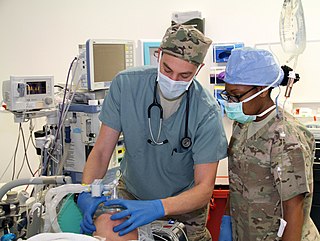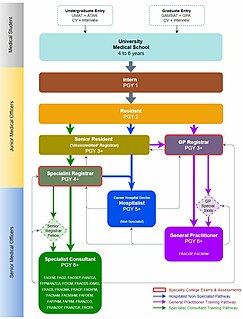In the medical profession, a general practitioner (GP) is a medical doctor who treats acute and chronic illnesses and provides preventive care and health education patient's illness. Their duties are not confined to specific organs of the body, and they have particular skills in treating people with multiple health issues. They are trained to treat patients of any age and sex to levels of complexity that vary between countries.

Anesthesiology, anaesthesiology, or anaesthesia is the medical specialty concerned with the total perioperative care of patients before, during and after surgery. It encompasses anesthesia, intensive care medicine, critical emergency medicine, and pain medicine. A physician specialized in anesthesiology is called an anesthesiologist, anaesthesiologist, or anaesthetist, depending on the country. In some countries, the terms are synonymous, while in other countries they refer to different positions and anesthetist is only used for non-physicians, such as nurse anesthetists.
A medical school is a tertiary educational institution, or part of such an institution, that teaches medicine, and awards a professional degree for physicians. Such medical degrees include the Bachelor of Medicine, Bachelor of Surgery, Master of Medicine, Doctor of Medicine (M.D.), or Doctor of Osteopathic Medicine (D.O.). Many medical schools offer additional degrees, such as a Doctor of Philosophy (Ph.D.), master's degree (M.Sc.) or other post-secondary education.

Residency or postgraduate training is specifically a stage of graduate medical education. It refers to a qualified physician, dentist or podiatrist (DPM) who practices medicine, dentistry, or podiatry, respectively, usually in a hospital or clinic, under the direct or indirect supervision of a senior medical clinician registered in that specialty such as an attending physician or consultant. In many jurisdictions, successful completion of such training is a requirement in order to obtain an unrestricted license to practice medicine, and in particular a license to practice a chosen specialty. In the meantime they practice "on" the license of their supervising physician. An individual engaged in such training may be referred to as a resident, registrar or trainee depending on the jurisdiction. Residency training may be followed by fellowship or sub-specialty training.
In the United Kingdom, junior doctors are qualified medical practitioners working whilst engaged in postgraduate training. The period of being a junior doctor starts when they qualify as a medical practitioner following graduation with a Bachelor of Medicine, Bachelor of Surgery degree and start the UK Foundation Programme, it culminates in a post as a Consultant, a General Practitioner (GP), or some other non-training post, such as a Staff grade or Associate Specialist post.
A senior house officer (SHO) is a non-consultant hospital doctor in the Republic of Ireland. SHOs are supervised in their work by consultants and registrars. In training posts these registrars and consultants oversee training and are usually their designated clinical supervisors.

Medical education in Australia includes the educational activities involved in the initial and ongoing training of Medical Practitioners. In Australia, medical education begins in Medical School; upon graduation it is followed by a period of pre-vocational training including Internship and Residency; thereafter, enrolment into a specialist-vocational training program as a Registrar eventually leads to fellowship qualification and recognition as a fully qualified Specialist Medical Practitioner. Medical education in Australia is facilitated by Medical Schools and the Medical Specialty Colleges, and is regulated by the Australian Medical Council (AMC) and Australian Health Practitioners Regulatory Agency (AHPRA) of which includes the Medical Board of Australia where medical practitioners are registered nationally.
Modernising Medical Careers (MMC) is a programme for postgraduate medical training introduced in the United Kingdom in 2005. The programme replaced the traditional grades of medical career before the level of Consultant. The different stages of the programme contribute towards a "Certificate of Completion of Training" (CCT). It has been dogged by criticism within and outside the medical profession, and an independent review of MMC led by Professor Sir John Tooke criticised many aspects of it.
Medical education in the United Kingdom includes educational activities involved in the education and training of medical doctors in the United Kingdom, from entry-level training through to continuing education of qualified specialists. A typical outline of the medical education pathway is presented here. However training schemes vary and different pathways may be available.
A medical intern is a physician in training who has completed medical school and has a medical degree but does not yet have a license to practice medicine unsupervised. Medical education generally ends with a period of practical training similar to internship, but the way the overall program of academic and practical medical training is structured differs depending upon the country, as does the terminology used.
A specialist registrar (SpR) is a doctor in the Republic of Ireland or in the United Kingdom who is receiving advanced training in a specialist field of medicine in order to become a consultant in that specialty.

The Royal College of General Practitioners (RCGP) is the professional body for general (medical) practitioners in the United Kingdom. The RCGP represents and supports GPs on key issues including licensing, education, training, research and clinical standards. It is the largest of the medical royal colleges, with over 50,000 members. The RCGP was founded in 1952 in London, England and is a registered charity. Its motto is Cum Scientia Caritas – "Compassion [empowered] with Knowledge."
A Senior Registrar was a grade of doctor in the United Kingdom or Ireland before being superseded during reforms in the 1990s. The senior registrar post still exists in Australia, whilst in the US, the title of “Senior Registrar” might be applied to a Senior or Chief Resident in Surgery.
A specialty registrar (StR) is a doctor, public health practitioner or dentist who is working as part of a specialty training programme in the UK. This is known as a training grade as these doctors are supervised to an extent, as part of a structured training experience that leads to being able to undertake independent practice in a hospital specialty or working as a general practitioner.
The Postgraduate Medical Education and Training Board was the non-departmental public body responsible for postgraduate medical education and training in the United Kingdom (UK). The General Medical Council (GMC) took over the functions of PMETB on 1 April 2010 when the two organisations merged.
Hertfordshire Intensive Care & Emergency Simulation Centre (HICESC) is an advanced teaching facility based at the University of Hertfordshire. At its creation in 1998, it was an inter-Faculty practical laboratory hosted by the Department of Electronic, Communication and Electrical Engineering (ECEE) for access by medical engineering students and jointly established by the Department of Nursing and Paramedic Sciences, Faculty of Health and Human Sciences for use by their students.
A clinical officer (CO) is a gazetted officer who is qualified and licensed to practice medicine.
Non-consultant hospital doctor (NCHD) commonly known as junior doctor is a term used in Ireland to describe qualified medical practitioners who work under the supervision of a consultant in a particular speciality. The clinical duties and responsibilities of NCHDs are varied but centre around the provision of medical care to patients. Examples of work carried out by NCHDs includes the diagnosis and treatment of medical conditions, performing therapeutic and diagnostic tests and interaction with other healthcare professionals. A clinical team made up of a consultant, or group of consultants, along with a cohort of NCHDs, is the core of medical service delivery in the Irish hospital system. A NCHD may be in a training programme or in a non-training role. Non-training doctors are employed most commonly at SHO or registrar level, and hold either 6 or 12 months contracts, a small number hold permanent posts. The doctors employed in non-training posts are not eligible for the trainee specialist division, and are most commonly registered on the general or supervised divisions of the Irish Medical Council register.
Membership of the Royal College of General Practitioners (MRCGP) is a postgraduate medical qualification in the United Kingdom (UK) run by the Royal College of General Practitioners (RCGP). On successful completion of the assessment, general practitioners are eligible to use the post-nominal letters MRCGP that indicate Membership of the RCGP.
Medical education in Wales refers to the education of medical students and qualified medical doctors in Wales.



